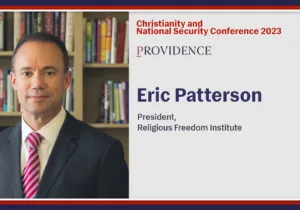Few labels elicit more ire in the views of contemporary Americans, Christians and non-Christians alike, than the two-word moniker, “Christian nationalism.” I am a strange candidate to come to its defense. I am one who has never been acutely tempted with pride in my home country of America. My mother’s side of the family hails from Poland and immigrated to the US merely a century ago. My father’s side consists of native Americans for whom “America” is a fraught concept. And my Christian political imagination has been largely shaped by various streams of “post-liberal” political theology—whether of the Anabaptist-Hauerwasian variety or forms more radically Orthodox and Catholic—which places emphasis on the church as the primary locus of our political identity and is critical of any migration of devotion to other political bodies or any diffusion or translation of theological categories to apply to worldly realities. I have published multiple articles on the political significance of the church, and my dissertation is on that topic with reference to the thought of French Catholic theologian Henri de Lubac. But yet I find myself drawn to this side of the contemporary debate. Why?
Well, first it appears that the term is often invoked in vague and dismissive ways. Here are the two most common understandings that the denunciations seem to imply: (1) Often, the detractors simply reject any form of Christian influence on politics at all. The problem here is with the “Christian” component of Christian nationalism. This view is problematic in many ways, which cannot be discussed within the limits of this essay. It will suffice to say that often the same people denouncing Christian influence in politics are quite willing to embrace it when it aligns with their ideology, partisan affiliation, and preferred political objectives. (2) The more serious criticism is that Christian nationalism has an inflated view of the nation, tying theological significance to America in particular as a central piece in the plans of God. Oftentimes, this is characterized in contradistinction to “patriotism,” which is perceived more positively and thus permissible for Christians; “nationalism” is then defined in solely pejorative terms, always as an expression of idolatry. While I share the concern about worshipping the nation—lifting it up to an idolatrous position as necessary in God’s plans or as an instantiation of the heavenly Kingdom—the distinctions commonly made between patriotism and nationalism tend to be somewhat artificial. Both basically refer to some level of loyalty to and identification with one’s homeland or people.
My brief, and modest, defense here is premised on a basic question: Is there a Christian case for commitment to the nation? Maybe a way to take the tone of the debate down a bit, consider an analogous question: Is there a case for “Christian localism”? I think most would immediately answer, “Yes,” and that leads nicely into the first item in my defense.
The first principle I wish to invoke is that of subsidiarity. In Catholic Social Thought (CST), subsidiarity essentially refers to the idea that nothing should be done by a larger and more complex organization that can be accomplished just as well by a smaller and simpler organization. Usually, this principle is brought up in reference to matters internal to a national body, arguing for the significance of less centralized forms of association and addressing social problems at the most personal level possible, instead of seeking to resolve every issue through the impersonal mechanisms of large-scale bureaucracy. This would also seem to have implications for the role of nations in contrast to global or multinational agencies.
The extension of this principle to the priority of the nation before international bodies becomes clearer if we consider the teachings of the political tradition of civic republicanism. This tradition has complex origins, but it does appear to constitute one aspect, along with biblical covenantalism, of the American founding. The basic ideas of this tradition are that for an authoritative body to be legitimate, it must be representative and accountable to those over whom it exerts authority. This is what secures real political agency, as opposed to arbitrary rule that unduly interferes in the lives of people—who, in such a scenario, become subjects under a form of domination. The nation-state is still the best body in which to produce this type of non-arbitrary authority.
A second, important principle of CST is that of solidarity. Christians are called to love their neighbors, feel a sense of responsibility for them, and commit to action with regard for their wellbeing. The link with subsidiarity becomes more evident when one considers the general Christian idea of moral proximity: that the more closely connected one’s neighbors are, the more responsibility one bears toward them. For evidence in the Bible, we find the teachings from Paul that Christians bear primary responsibility to take care of our own families (1 Tim. 5:8), and that we are to do good to all, but especially the household of God (Gal. 6:10). The use of the word “household” to refer to the church seems apt here—it is a family term, with connotations of proximity. Two extrabiblical sources also capture this dynamic. Fyodor Dostoevsky powerfully conveyed the idea that one of the best ways to inhibit love for actual persons is to be committed to “Humanity” in general. One of the famous quotes of liberation theology is from Gustavo Gutiérrez: “You say you love the poor? Then tell me, what are their names?” So, if we intend to truly love our neighbors, it seems necessary to love those within our nation as opposed to committing ourselves to a vague universal humanitarianism.
This is especially important in our age in which such loyalties are profoundly undermined and dismissed by those whom David Goodhart labels the “Anywheres”—cosmopolitan elites who can easily conduct their affairs within, and move their business to, any part of the globe—as opposed to the “Somewheres,” who are tethered to a specific people and place. It is also important in a time in which the burgeoning of the divisive tribalism of identity politics continues apace. This phenomenon pits groups against each other in a zero-sum contest for power and resources and has within itself no apparent resources for unity. The solidarity of the nation, if inclusive and non-ethnocentric, could be a pole around which to gather and a project in which to collaborate.
The last principle in this defense is old and very basic: the commandment to honor one’s parents (Exod. 20:12; Deut. 5:16; Eph. 6:1f). Yes, this seems strange to invoke here, but in the Christian tradition, this commandment has been generally understood to extend in application to one’s fatherland (or, in our day, the nation). It was interpreted as referring not just to one’s parents, but all authorities.
Connecting one’s love for and loyalty to the nation with this commandment is instructive in terms of the temptation to idolize the nation. The Bible complements this command to honor one’s parents with Christ’s teaching that, in comparison with our ultimate loyalty to Him (Mark 10:34-39), we are to “hate” our parents (Luke 14:26). Christ made clear that He did not come to abolish the law (Matt. 5:17), and thus He still calls us to honor our parents (Matt. 15:4; 19:19; Mark 7:10; 10:19; Luke 18:20). The point here is the proper ordering of our loves and loyalties. We are to put first things first so that we avoid the idolatry of worshipping created things above the Creator (Rom. 1:25). But to resist becoming idolaters does not mean we must become iconoclasts; created realities can serve as analogous signposts to heavenly realities if related to properly. Thus, secondary and subordinate loves can be properly ordered to primary ones. Properly ordering our loves does not mean loving God and hating everything else; that is Manichaean. Rather, we are to love created realities in, for, and unto God. This applies to our respective nations. To seek God and His Kingdom above all does not mean we must denigrate the nation in which we live. Our ultimate hope that will not be satisfied in this life or in any nation should inspire and inform efforts to enact foretastes of the future in the here and now.
So, God bless America






